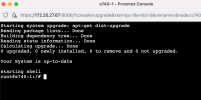i installed a fresh proxmox 7.3 and during upgrade to latest pvetest, i noticed this grub error message.
i'm using zfs root. the system (futro s740) does not have legacy boot and can only boot via uefi
not sure if that's worth taking a closer look, but it looks ugly/weird.
i can offer debugging this, if desired. @Stoiko Ivanov , please let me know.
at the moment, i'm sensible about any s740 boot issues, because i had lost uefi boot entries yesterday. that also had been reported by a colleague of mine, who owns the same system.
at least for my system, it was a flaky sata connection and i think that was causing corruption on partitions (for example partition guid on /dev/sda2 suddenly had some weird value). anyhow, it's weird that uefi boot entry for proxmox got entirely lost from nvram (while i could still import rpool via proxmox boot cd).
i'm using zfs root. the system (futro s740) does not have legacy boot and can only boot via uefi
not sure if that's worth taking a closer look, but it looks ugly/weird.
i can offer debugging this, if desired. @Stoiko Ivanov , please let me know.
at the moment, i'm sensible about any s740 boot issues, because i had lost uefi boot entries yesterday. that also had been reported by a colleague of mine, who owns the same system.
at least for my system, it was a flaky sata connection and i think that was causing corruption on partitions (for example partition guid on /dev/sda2 suddenly had some weird value). anyhow, it's weird that uefi boot entry for proxmox got entirely lost from nvram (while i could still import rpool via proxmox boot cd).
Code:
Setting up grub-pc (2.06-3~deb11u5) ...
Generating grub configuration file ...
Found linux image: /boot/vmlinuz-5.15.102-1-pve
Found initrd image: /boot/initrd.img-5.15.102-1-pve
/usr/sbin/grub-probe: error: unknown filesystem. <---!
Found linux image: /boot/vmlinuz-5.15.74-1-pve
Found initrd image: /boot/initrd.img-5.15.74-1-pve
/usr/sbin/grub-probe: error: unknown filesystem. <---!
Found memtest86+ image: /ROOT/pve-1@/boot/memtest86+.bin
Found memtest86+ multiboot image: /ROOT/pve-1@/boot/memtest86+_multiboot.bin
Warning: os-prober will not be executed to detect other bootable partitions.
Systems on them will not be added to the GRUB boot configuration.
Check GRUB_DISABLE_OS_PROBER documentation entry.
Adding boot menu entry for UEFI Firmware Settings ...
done
Setting up libproxmox-acme-plugins (1.4.4) ...
Setting up pve-kernel-5.15 (7.3-3) ...
Setting up swtpm (0.8.0~bpo11+3) ...
Setting up bind9-dnsutils (1:9.16.37-1~deb11u1) ...
Setting up libzpool5linux (2.1.9-pve1) ...
Setting up zfsutils-linux (2.1.9-pve1) ...
Setting up swtpm-tools (0.8.0~bpo11+3) ...
Setting up zfs-initramfs (2.1.9-pve1) ...
Setting up zfs-zed (2.1.9-pve1) ...
Setting up libproxmox-acme-perl (1.4.4) ...
Setting up libpve-common-perl (7.3-2) ...
Setting up pve-cluster (7.3-2) ...
Setting up libpve-cluster-perl (7.3-2) ...
Setting up libpve-http-server-perl (4.1-6) ...
Setting up libpve-storage-perl (7.3-2) ...
Setting up libpve-access-control (7.3-2) ...
Setting up libpve-cluster-api-perl (7.3-2) ...
Setting up qemu-server (7.3-4) ...
Setting up pve-manager (7.3-6) ...
Processing triggers for man-db (2.9.4-2) ...
Processing triggers for mailcap (3.69) ...
Processing triggers for pve-ha-manager (3.5.1) ...
Processing triggers for initramfs-tools (0.140) ...
update-initramfs: Generating /boot/initrd.img-5.15.102-1-pve
Running hook script 'zz-proxmox-boot'..
Re-executing '/etc/kernel/postinst.d/zz-proxmox-boot' in new private mount namespace..
Copying and configuring kernels on /dev/disk/by-uuid/2BF2-A476
Copying kernel and creating boot-entry for 5.15.102-1-pve
Copying kernel and creating boot-entry for 5.15.74-1-pve
Processing triggers for libc-bin (2.31-13+deb11u5) ...
Processing triggers for rsyslog (8.2102.0-2+deb11u1) ...
Your System is up-to-date
Seems you installed a kernel update - Please consider rebooting
this node to activate the new kernel.
starting shell
Last edited:


